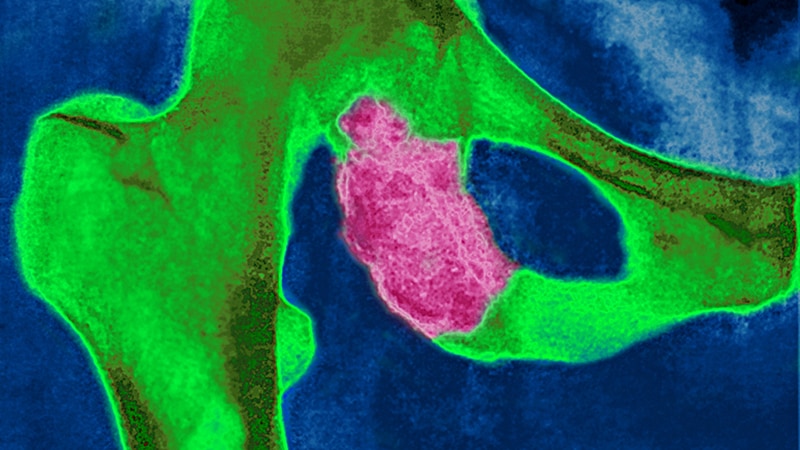The monoclonal antibody tanezumab (Raylumis, Pfizer/Lilly) appears to reduce cancer pain associated with bone metastases in patients who are already taking opioid therapy, results from a phase 3 trial suggest.
Professor Marie Fallon, Cancer Research UK Edinburgh Centre, University of Edinburgh, and colleagues randomised 145 cancer patients with ongoing pain to tanezumab, which targets nerve growth factor, or placebo.
The monoclonal antibody compared with placebo significantly reduced pain at the primary bone metastasis cancer pain site from week 1 all the way through to week 8.
However, the results, presented at the European Society for Medical Oncology (ESMO) Annual Meeting 2021 on September 17, suggest the reduction does not remain significant beyond 8 weeks, despite ongoing treatment, and two patients on tanezumab experienced pathologic fractures.
Tanezumab had “superior analgesic efficacy” over placebo in patients already receiving optimised background opioids, said Prof Fallon, and the safety profile was “generally consistent” with the expected adverse events.
“Overall, these data demonstrate the potential of a nerve growth factor inhibitor such as tanezumab to reduce pain caused by bone metastases.”
EMA Announcement
The results were a slice of good news for the manufacturers of tanezumab, coming one day after the European Medicines Agency recommended the refusal of marketing authorisation for the drug for the treatment of osteoarthritis pain.
The Agency said the therapy offered only “small” benefits over placebo, and no improvement in pain relief or physical functioning compared with non-steroidal anti-inflammatory drugs, while increasing the risk of side effects such as rapid progressive osteoarthritis and joint replacement.
The announcement came 6 months after a panel at the US Food and Drug Administration voted 19 to 1 that, while tanezumab can offer clinical benefits, the associated risk for joint destruction or rapidly progressive osteoarthritis was too great, despite a risk mitigation strategy proposed by the manufacturers.
Comparisons
Discussing the current findings, Dr Florian Scotté, medical oncologist, Gustave Roussy Cancer Campus, Villejuif, France, asked whether the study included comparison of tanezumab with bisphosphates.
Prof Fallon replied that it did not, saying that patients “had to be on stable analgesia of any kind in the background before entry into the study”, which could include bisphosphonates, “but there was no comparison as such”.
On Twitter, Dr Snezana Bosnjak, research professor, Institute for Oncology and Radiology of Serbia, Belgrade, commented that results indicate that tanezumab has the “potential” to reduced uncontrolled cancer bone pain.
However, she underlined that pathologic fractures occurred only with the monoclonal antibody, as well as highlighting the lack of data looking at treatment with bisphosphonates.
#ESMO21: Potential of tanezumab SC (nerve growth factor antibody) to reduce #bonecancer pain uncontrolled w/ opioids vs placebo: superior efficacy at week 8 (not beyond), pathological fractures only in tanezumab group, data about Tx w/ bisphoshonates n/a
— Dr Snezana Bosnjak (@bosnjaksupport) September 17, 2021
Prof Fallon noted that bone is “among the most common sites of cancer metastasis and the most common cause of cancer-related pain”.
Indeed, it has been estimated that 25% of cancer patients with painful bone metastases suffer from uncontrolled pain, despite a range of treatment options being available.
The team therefore conducted a phase 3, randomised, double-blind trial to examine the efficacy and safety of tanezumab, an anti-nerve growth factor monoclonal antibody, in cancer pain.
Study Details
Patients were included if they had cancer that had metastasized to the bone or multiple myeloma, had an average pain intensity score ≥5 on a 1–10 scale at the index bone metastasis cancer pain site, and were already receiving background opioid therapy.
One hundred and forty-five patients were randomised to subcutaneous tanezumab or placebo every 8 weeks for 24 weeks, a total of three doses, while continuing to receive optimised opioid therapy.
After the treatment phase, patients were followed-up for a further 24 weeks to assess safety.
Prof Fallon showed that the baseline characteristics of the tanezumab and placebo arms were “mostly similar”, although the ratio of males to females was higher in the tanezumab group.
She added that the patient population was “predominantly White, with breast, prostate and lung carcinoma being the most common primary cancer types”.
The trial met its primary endpoint, with tanezumab showing a significantly greater improvement in average pain intensity over placebo at the index bone metastasis cancer pain site at week 8.
The least squares mean change in pain at week 8 was -2.03 for tanezumab versus -1.25 for placebo (p≤0.05), and was also significantly in favour of tanezumab at weeks 1, 2, 4 and 6.
However, “differences between the tanezumab and placebo groups were not statistically significant past week 8,” noted Prof Fallon, “though the study was not powered to test the durability of the analgesic efficacy”.
She also showed that adverse events, including those deemed serious and severe, were “more frequent” with tanezumab than with placebo, although discontinuations from treatment or the study were more common with placebo.
The most common adverse events were anaemia, at 8.3% in the tanezumab group versus 12.3% in placebo patients and arthralgia, at 8.3% versus 8.2%.
The proportion of patients who experienced a prespecified joint safety event during the study was 2.8% with tanezumab, comprising two pathologic fractures near the site of bone metastases, versus 0.0% with placebo.
No instances of rapidly progressive osteoarthritis were reported.
Although there were 21 deaths in the tanezumab arm and 23 in the placebo group, none of these were considered to be treatment-related.
The study was funded by Pfizer and Eli Lilly.
Prof Fallon declares relationships with Pfizer.
Dr Scotté declares relationships with Leo Pharma, AMGEN, MSD, Pierre Fabre, Mylan, Thermofisher, Viforpharma, Helsinn, BMS, Pfizer, MundiPharma, Tilray, Chugai.
ESMO Congress 2021: Abstract LBA62. Presented September 17.

